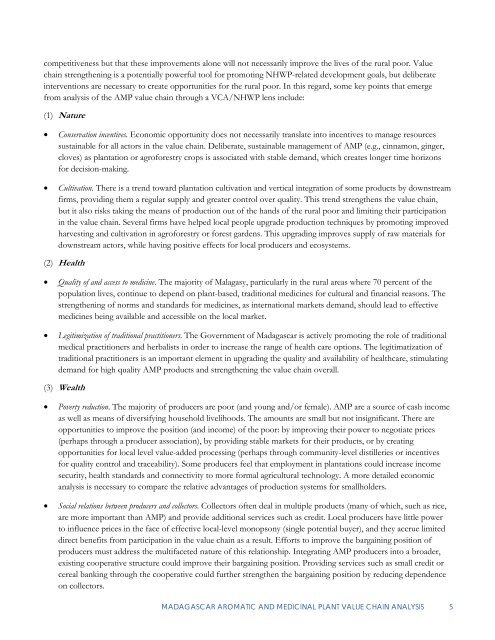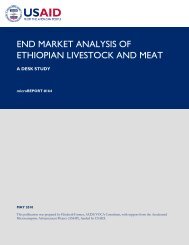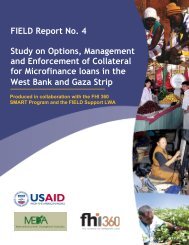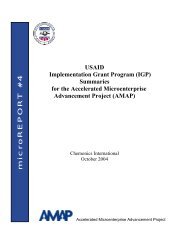Madagascar Aromatic and Medicinal Plants Value - Microlinks
Madagascar Aromatic and Medicinal Plants Value - Microlinks
Madagascar Aromatic and Medicinal Plants Value - Microlinks
You also want an ePaper? Increase the reach of your titles
YUMPU automatically turns print PDFs into web optimized ePapers that Google loves.
competitiveness but that these improvements alone will not necessarily improve the lives of the rural poor. <strong>Value</strong><br />
chain strengthening is a potentially powerful tool for promoting NHWP-related development goals, but deliberate<br />
interventions are necessary to create opportunities for the rural poor. In this regard, some key points that emerge<br />
from analysis of the AMP value chain through a VCA/NHWP lens include:<br />
(1) Nature<br />
• Conservation incentives. Economic opportunity does not necessarily translate into incentives to manage resources<br />
sustainable for all actors in the value chain. Deliberate, sustainable management of AMP (e.g., cinnamon, ginger,<br />
cloves) as plantation or agroforestry crops is associated with stable dem<strong>and</strong>, which creates longer time horizons<br />
for decision-making.<br />
• Cultivation. There is a trend toward plantation cultivation <strong>and</strong> vertical integration of some products by downstream<br />
firms, providing them a regular supply <strong>and</strong> greater control over quality. This trend strengthens the value chain,<br />
but it also risks taking the means of production out of the h<strong>and</strong>s of the rural poor <strong>and</strong> limiting their participation<br />
in the value chain. Several firms have helped local people upgrade production techniques by promoting improved<br />
harvesting <strong>and</strong> cultivation in agroforestry or forest gardens. This upgrading improves supply of raw materials for<br />
downstream actors, while having positive effects for local producers <strong>and</strong> ecosystems.<br />
(2) Health<br />
• Quality of <strong>and</strong> access to medicine. The majority of Malagasy, particularly in the rural areas where 70 percent of the<br />
population lives, continue to depend on plant-based, traditional medicines for cultural <strong>and</strong> financial reasons. The<br />
strengthening of norms <strong>and</strong> st<strong>and</strong>ards for medicines, as international markets dem<strong>and</strong>, should lead to effective<br />
medicines being available <strong>and</strong> accessible on the local market.<br />
• Legitimization of traditional practitioners. The Government of <strong>Madagascar</strong> is actively promoting the role of traditional<br />
medical practitioners <strong>and</strong> herbalists in order to increase the range of health care options. The legitimatization of<br />
traditional practitioners is an important element in upgrading the quality <strong>and</strong> availability of healthcare, stimulating<br />
dem<strong>and</strong> for high quality AMP products <strong>and</strong> strengthening the value chain overall.<br />
(3) Wealth<br />
• Poverty reduction. The majority of producers are poor (<strong>and</strong> young <strong>and</strong>/or female). AMP are a source of cash income<br />
as well as means of diversifying household livelihoods. The amounts are small but not insignificant. There are<br />
opportunities to improve the position (<strong>and</strong> income) of the poor: by improving their power to negotiate prices<br />
(perhaps through a producer association), by providing stable markets for their products, or by creating<br />
opportunities for local level value-added processing (perhaps through community-level distilleries or incentives<br />
for quality control <strong>and</strong> traceability). Some producers feel that employment in plantations could increase income<br />
security, health st<strong>and</strong>ards <strong>and</strong> connectivity to more formal agricultural technology. A more detailed economic<br />
analysis is necessary to compare the relative advantages of production systems for smallholders.<br />
• Social relations between producers <strong>and</strong> collectors. Collectors often deal in multiple products (many of which, such as rice,<br />
are more important than AMP) <strong>and</strong> provide additional services such as credit. Local producers have little power<br />
to influence prices in the face of effective local-level monopsony (single potential buyer), <strong>and</strong> they accrue limited<br />
direct benefits from participation in the value chain as a result. Efforts to improve the bargaining position of<br />
producers must address the multifaceted nature of this relationship. Integrating AMP producers into a broader,<br />
existing cooperative structure could improve their bargaining position. Providing services such as small credit or<br />
cereal banking through the cooperative could further strengthen the bargaining position by reducing dependence<br />
on collectors.<br />
MADAGASCAR AROMATIC AND MEDICINAL PLANT VALUE CHAIN ANALYSIS 5





